GALLUP NEWS SERVICE
PRINCETON, NJ -- In the wake of the successful U.S.-led military campaign in Iraq, Americans now express significantly greater optimism about progress in the war on terrorism than they did before the war, and a majority believes the war has made the United States safer from terrorism. The public's worry level about becoming a victim, however, has not changed appreciably from what it was before the war in Iraq began. On a related matter, most Americans today are not willing to sacrifice their civil liberties in order to prevent terrorism from occurring in the United States.
According to a recent CNN/USA Today/Gallup poll, conducted April 22-23, 65% of Americans now say the United States and its allies are winning the war against terrorism. That represents a major increase from the results of a similar poll on March 3-5, when only 37% expressed that view.
| Who is Winning the War on Terrorism? |
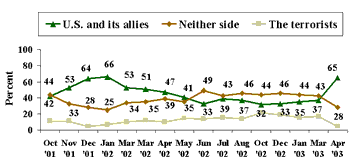 |
The current numbers are in the same range as those obtained in December 2001 and January 2002 polls, as the United States was ending a successful war against the Taliban in Afghanistan. But public optimism waned as the months wore on and Osama bin Laden remained at large. From the summer of last year through early March of this year, more Americans said neither side was winning than said the United States and its allies were winning.
One reason for the current surge in optimism may be that President Bush has said there is a link between Saddam Hussein and the terrorist group al Qaeda. Thus, many people could believe that overthrowing the Iraqi regime was a sign of progress in the war on terrorism. This assumption seems to be supported by the poll, which shows that, by a margin of 58% to 33%, Americans think the war with Iraq has made the United States safer, rather than less safe, from terrorism.
| Do You Think the War With Iraq has Made the U.S. Safer -- or Less Safe -- From Terrorism? |
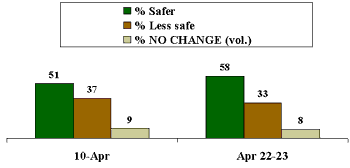 |
Worry Level Steady and Low
Despite a majority belief that the nation is now safer from terrorism, Americans appear no more or less worried about becoming a victim of terrorism than they were before the war with Iraq began. Overall, 34% say they are very or somewhat worried, down from 38% a month ago during the war, and 36% prior to the start of the war.
| How Worried About Becoming Terrorist Victim? |
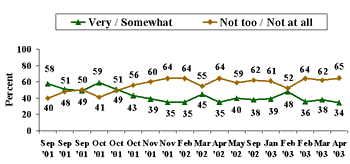 |
Since 9/11, the level of worry has fluctuated, depending mostly on the news -- during periods of government terror alerts or increased news stories about terrorism, worry has increased. The current level is at the lowest since 9/11, but not statistically different from several other periods when worry was at the 35% level: November 2001, February 2002, and April 2002.
A separate question finds that 35% of Americans are worried about being exposed to a deadly disease spread by terrorists in the United States. The results of this question are virtually identical to those measured by the more general question about being a victim of terrorism.
How worried are you that you or someone in your family will be exposed to a deadly disease spread by terrorists in the United States -- very worried, somewhat worried, not too worried, or not worried at all?
BASED ON -- 511 -- NATIONAL ADULTS IN FORM B
|
|
Some-what worried |
|
Not |
KNOW A VICTIM (vol.) |
|
|
|
2003 Apr 22-23 |
6% |
29 |
40 |
25 |
-- |
-- |
Concern About Civil Liberties
Most Americans today are not willing to give up their civil liberties in the effort to prevent terrorism in the United States. The poll shows that just a third of Americans, 33%, say the government should take all steps necessary to prevent additional acts of terrorism in the United States, even if it means their civil liberties would be violated. Sixty-four percent take a different point of view, that the government should take steps to prevent additional acts of terrorism, but only if those steps would not violate their basic civil liberties.
| Civil Liberties vs. Terrorism Protection |
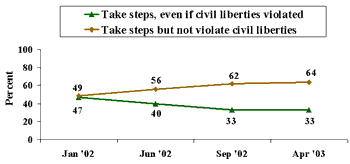 |
When this question was first asked in January 2002, just a few months after the 9/11 attacks, the public was about evenly divided on the issue, with 47% preferring to take all steps necessary, and 49% unwilling to give up basic civil liberties. Five months later, in June 2002, the mood shifted toward greater concern about civil liberties. Three months after that, in September 2002, the Gallup Poll found even greater support for civil liberties, at about the same level it is now.
Although there are large differences by party and political philosophy, all major subgroups show at least a majority opting for civil liberties. Republicans do so, by 52% to 45%, compared with a 74% to 21% margin among Democrats.
| Civil Liberties vs. Terrorism Protection: by Party ID |
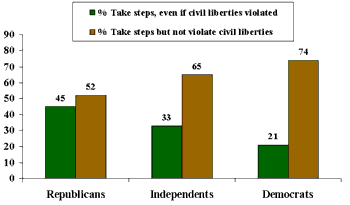 |
| April 22-23, 2003 |
Similarly, conservatives choose civil liberties by 54% to 42%, while liberals do so by 80% to 16%.
| Civil Liberties vs. Terrorism Protection: by Political Ideology |
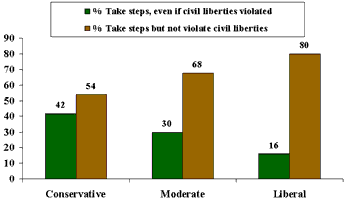 |
| April 22-23, 2003 |
Survey Methods
Results are based on telephone interviews with 1,001 national adults, aged 18+, conducted April 22-23, 2003. For results based on the total sample of national adults, one can say with 95% confidence that the maximum margin of sampling error is ±3 percentage points. In addition to sampling error, question wording and practical difficulties in conducting surveys can introduce error or bias into the findings of public opinion polls.
How worried are you that you or someone in your family will become a victim of terrorism -- very worried, somewhat worried, not too worried, or not worried at all?
BASED ON -- 490 -- NATIONAL ADULTS IN FORM A
|
|
Some-what worried |
|
Not |
KNOW A VICTIM (vol.) |
|
||
|
% |
% |
% |
% |
% |
% |
||
|
2003 Apr 22-23 ^ |
8 |
26 |
39 |
26 |
* |
1 |
|
|
2003 Mar 22-23 |
8 |
30 |
38 |
24 |
-- |
* |
|
|
2003 Feb 17-19 |
8 |
28 |
33 |
31 |
* |
-- |
|
|
2003 Feb 7-9 ^ |
13 |
35 |
34 |
18 |
* |
* |
|
|
2003 Jan 23-25 |
8 |
31 |
36 |
25 |
-- |
* |
|
|
2002 Sep 2-4 |
8 |
30 |
37 |
25 |
* |
* |
|
|
2002 May 28-29 |
9 |
31 |
37 |
22 |
1 |
* |
|
|
2002 Apr 22-24 |
8 |
27 |
39 |
25 |
1 |
* |
|
|
2002 Mar 4-7 |
12 |
33 |
32 |
23 |
* |
* |
|
|
2002 Feb 4-6 ^ |
8 |
27 |
39 |
25 |
-- |
1 |
|
|
2001 Nov 26-27 |
8 |
27 |
34 |
30 |
1 |
* |
|
|
2001 Nov 2-4 |
11 |
28 |
34 |
26 |
-- |
1 |
|
|
2001 Oct 19-21 † |
13 |
30 |
33 |
23 |
* |
1 |
|
|
2001 Oct 11-14 † |
18 |
33 |
35 |
14 |
* |
* |
|
|
2001 Oct 5-6 † |
24 |
35 |
27 |
14 |
* |
* |
|
|
2001 Sep 21-22 † |
14 |
35 |
32 |
18 |
* |
1 |
|
|
2001 Sep 14-15 † |
18 |
33 |
35 |
13 |
* |
1 |
|
|
2001 Sep 11 † ‡ |
23 |
35 |
24 |
16 |
1 |
1 |
|
|
2000 Apr 7-9 ^ |
4 |
20 |
41 |
34 |
-- |
1 |
|
|
1998 Aug 20 ‡ ? |
10 |
22 |
38 |
29 |
-- |
1 |
|
|
1996 Jul 20-21 ‡ |
13 |
26 |
34 |
27 |
-- |
* |
|
|
1996 Apr 9-10 ? |
13 |
22 |
33 |
32 |
-- |
* |
|
|
1995 Apr 21-23 ? |
14 |
28 |
33 |
24 |
-- |
1 |
|
|
^ |
Asked of a half sample. |
||||||
|
† |
WORDING: How worried are you that you or someone in your family will become a victim of a terrorist attack -- very worried, somewhat worried, not too worried, or not worried at all? |
||||||
|
‡ |
Based on one night poll of national adults with a margin of error of ±4 pct. pts. |
||||||
|
? |
WORDING: How worried are you that someone in your family will become a victim of a terrorist attack similar to the bombing in Oklahoma City? |
||||||
|
? |
WORDING: How worried are you that you or someone in your family will become a victim of a terrorist attack similar to the bombing in Oklahoma City? |
||||||
How worried are you that you or someone in your family will be exposed to a deadly disease spread by terrorists in the United States -- very worried, somewhat worried, not too worried, or not worried at all?
BASED ON -- 511 -- NATIONAL ADULTS IN FORM B
|
|
Some-what worried |
|
Not |
KNOW A VICTIM (vol.) |
|
|
|
2003 Apr 22-23 |
6% |
29 |
40 |
25 |
-- |
-- |
Who do you think is currently winning the war against terrorism -- [ROTATED: the U.S. and its allies, neither side, or the terrorists]?
|
U.S. and |
Neither |
The |
No |
||
|
% |
% |
% |
% |
||
|
2003 Apr 22-23 |
65 |
28 |
5 |
2 |
|
|
2003 Mar 3-5 ^ |
37 |
43 |
17 |
3 |
|
|
2003 Jan 31-Feb 2 ^ |
35 |
44 |
16 |
5 |
|
|
2002 Dec 5-8 ^ |
33 |
46 |
19 |
2 |
|
|
2002 Oct 14-17 ^ |
32 |
44 |
21 |
3 |
|
|
2002 Aug 5-8 ^ |
37 |
46 |
14 |
3 |
|
|
2002 Jul 5-8 |
39 |
43 |
16 |
2 |
|
|
2002 Jun 21-23 |
33 |
49 |
14 |
4 |
|
|
2002 May 28-29 |
41 |
35 |
15 |
9 |
|
|
2002 Apr 22-24 |
47 |
39 |
10 |
4 |
|
|
2002 Mar 22-24 |
51 |
35 |
12 |
2 |
|
|
2002 Mar 4-7 |
53 |
34 |
10 |
3 |
|
|
2002 Jan 7-9 ^ |
66 |
25 |
7 |
2 |
|
|
2001 Dec 6-9 |
64 |
28 |
5 |
3 |
|
|
2001 Nov 8-11 ^ |
53 |
33 |
11 |
3 |
|
|
2001 Oct 11-14 |
42 |
44 |
11 |
3 |
|
|
^ |
Asked of a half sample. |
||||
Do you think the war with Iraq has made the U.S. safer -- or less safe -- from terrorism?
|
Safer |
Less safe |
NO CHANGE |
No opinion |
||
|
2003 Apr 22-23 |
58% |
33 |
8 |
1 |
|
|
2003 Apr 10 ^ |
51% |
37 |
9 |
3 |
|
|
^ |
Polls conducted entirely in one day, such as this one, are subject to additional error or bias not found in polls conducted over several days. |
||||
Which comes closer to your view -- [ROTATED: the government should take all steps necessary to prevent additional acts of terrorism in the U.S. even if it means your basic civil liberties would be violated, (or) the government should take steps to prevent additional acts of terrorism but not if those steps would violate your basic civil liberties]?
|
|
Take steps, even if |
Take steps but not violate civil liberties |
No |
|
|
2003 Apr 22-23 |
33% |
64 |
3 |
|
|
2002 Sep 2-4 ^ |
33% |
62 |
5 |
|
|
2002 Jun 21-23 |
40% |
56 |
4 |
|
|
2002 Jan 25-27 |
47% |
49 |
4 |
|
|
^ |
Asked of a half sample. |
|||
(vol.) – volunteered response
* -- less than 0.5%
